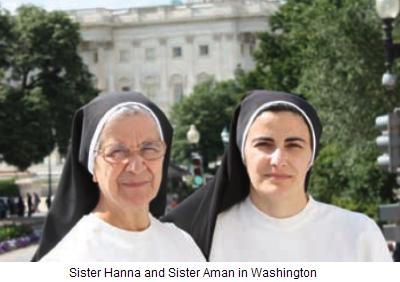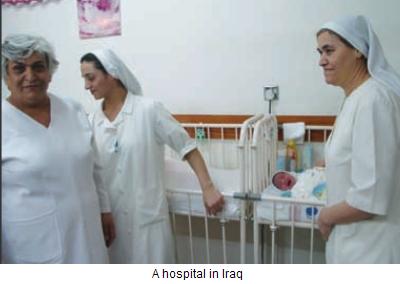

 I am a retired American Army officer. Since my retirement, I have been hired by both the private sector and federal government to act as an advisor to friendly foreign governments. I recently spent two years as a State Department civil servant living in Baghdad, where I worked with the Iraqi police, judges, courts, and the Ministries of Interior and Justice.
I am a retired American Army officer. Since my retirement, I have been hired by both the private sector and federal government to act as an advisor to friendly foreign governments. I recently spent two years as a State Department civil servant living in Baghdad, where I worked with the Iraqi police, judges, courts, and the Ministries of Interior and Justice.
During that period, I consulted with people from many nations and I also came to know Iraqis who are Assyrians, the descendants of the people we read about in the Old Testament, whose capital city was Nineveh. Among other things, they gave us writing (cuneiforms), the first legal system (Hammurabi's code), and many of the original folk stories and knowledge we credit to the Greeks (Aesop's fables) or the Persians/Ottomans (Tales of the Arabian Nights).
Education and the pursuit of knowledge have been important throughout the whole history of the Assyrian people, traditionally given to start in 4750 B.C. Their education helped them prosper -- but it was also a source of contention even in modern times, including during the time of Saddam Hussein. Since the invasion of 2003, large numbers of doctors, lawyers, bankers, university professors and other educated professionals have been targeted by insurgents and are now refugees.
When I write about the Assyrian people I am talking about the ethnic group who trace their heritage back 6759 years to Ashur in Mesopotamia and includes the entire native, non-Arab peoples of the Tigris and Euphrates valleys. They may also be called Chaldeans and Syriacs depending on what part of the region they originated in and confessionally are Eastern Rite Catholics (Assyrians, Chaldeans, and Syriacs), Orthodox (Syriac) and members of the Assyrian Church of the East. The Assyrian Church of the East Patriarch resides in Chicago, The Chaldean Catholic Patriarch resides in Baghdad, Iraq and the Syriac Orthodox Patriarch is in Damascus, Syria. All these groups share a similar ethnic, cultural and religious background.
Iraqi Women Religious at Work
After I returned to the United States, I remained in contact with many of the friends and colleagues I met while in Iraq. In February of this year, one of the Americans contacted me. He was an advisor with one of the Provincial Reconstruction Teams at the same time I worked with the Iraqi Ministry of Justice. This friend had been asked by the Papal Nuncio for Iraq and Jordan to try to assist a group of Iraqi women religious.
These Sisters--the Dominican Sisters of St. Catherine of Siena in Iraq--had operated various institutions in central and northern Iraq for a long period of time. Since the First Gulf War in 1990/1991 and the sanctions imposed on Iraq by the United Nations, their capacity to provide healthcare and education had been severely tested. After the invasion of 2003, a number of their institutions were attacked and several Sisters injured.
Despite the dangers and hardships, these Sisters have availed themselves of every reasonable opportunity to serve God through service to neighbor, including healing and teaching in Baghdad, in Mosul, and in the refugee camps of Syria, Lebanon and Jordan.
The Prioress of this order is a 69-year-old Iraqi, Sister Maria Hanna. She has a deep and abiding faith in a merciful God, a profound love for her neighbors, and extraordinary hope for a better future. Her order is consecrated in the Eastern Rite of the Catholic Church and includes women of all the backgrounds which represent Iraq. Their spiritually is Dominican and they are part of the world-wide family of St. Dominic and St. Catherine of Siena.
 Seeing that conditions in Iraq were not going to be normal for some time, she reached out to Dominican communities throughout the world and established many worthwhile partnerships with them. These partnerships allowed a number of her Sisters to enter advanced education programs to study medicine, education, languages and information systems, knowledge they brought back to Iraq as they returned home.
Seeing that conditions in Iraq were not going to be normal for some time, she reached out to Dominican communities throughout the world and established many worthwhile partnerships with them. These partnerships allowed a number of her Sisters to enter advanced education programs to study medicine, education, languages and information systems, knowledge they brought back to Iraq as they returned home.
Sister Hanna and the other Dominican Sisters who remained in Iraq also continued to work for Iraq's future. Among other ministries, today they operate a Baghdad maternity hospital considered by many to be the finest medical facility in the country. They serve all Iraqis in their healthcare and education ministries.
Dreams of a New Hospital
The specific reason that the Nuncio asked for assistance is that Sister Hanna has dreamed for more than ten years of a new maternity hospital in the stretch of fertile land near the city of Mosul known as the Nineveh Plain. Violence there is still high but the need for the hospital is even greater. This is the area where most of the remaining religious minorities of Iraq live (north and east of Mosul).
Sadly, very little aid of any kind has gone to this area. The U.S. Congress, noticing this lack, now requires that the State Department account for all money that is spent in Iraq for the religious minorities. Champions of this effort have been Representatives Frank Wolf (R-VA), Mark Kirk (R-IL), Christopher Smith (R-NJ) and Anna Eshoo (D-CA). In spite of the reporting requirement clearly identified in law, no specific efforts have been created by the Executive Branch to assist our friends in Iraq.
After our initial contact with the Prioress and the Nuncio, we worked to put together a team of people to assist. One team member, Marty Hudson, was the Acting Health Attach

or register to post a comment.